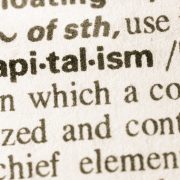Capitalism has often been described by as “a system of competition” by its adversaries, or a system “based on competition.” Naturally, this assertion is usually coupled with a spirited oration on how this “tooth n’ nail” competition psychologically corrupts us – pitting man against man in a “race to the bottom.”
Many of capitalism’s most vocal advocates have, themselves, imbibed this premise uncritically. They leap to a fervent defenses of competition, extolling its virtues — real or perceived. In my view, this is a mistake. To accept without evaluation the presupposition that capitalism is a system of competition — in contrast to other hypothetical systems of cooperation (namely socialism and communism) — is to frame the very debate itself in leftist terms and play the game on an unfairly tilted game-board.
Capitalism Is About Voluntary Exchange.
This is not to say that competition is necessarily an evil either. The problem is that defining capitalism as “a system of competition” — in comparison to other systems which are supposedly “cooperative” — is a rhetorical ploy. Those who profess it may honestly believe it to be so, but it’s not true. Capitalism is not “a system of competition.” any more than any other system. Capitalism (at least in its free-market, laissez faire ideal) is a system of the voluntary exchange of goods and services in the absence of physical coercion, theft, compulsion or fraud, predicated upon the fundamental right to own and accumulate property.
Or, for brevity: Capitalism is a system of voluntary exchange, predicated upon the right to own property.
One might even venture, therefore, that it is capitalism that is the system most characterized by cooperation.
Because Scarcity Exists, Competition Is Inherent In Any System.
After all, it is not the presence of private property or the free exchange of goods that creates the presence of competition in a capitalist system. Scarcity causes that. In any situation of scarcity of resources, there is bound to be some form of competition over those resources (as well as over how those resources are allocated).
If we have a system that allows voluntary exchange, some competition is bound to arise out of that, but that would happen under any system. Even if you had a completely communistic society, which was centrally planned and involved no exchange of money whatsoever, people’s time would still be limited. If you were a filmmaker in this society, you would probably want as many people to see your films as possible. As would every other film-maker. This would put you at least somewhat in competition with them. Does this mean that communism, too, is a system of competition? Certainly you would be competing for the only customer — the sponsorship of the state. Corruption and cronyism would surely be the result. Who gets their film made and who doesn’t? Who allocates the highly desirable job of being a film-maker over the undesirable job of being a street-sweeper or refuse collector, and how can their favor be courted? The competition will commence, but instead of being decided by the free and voluntary exchange of film-goers, investors and film-makers it will be decided by someone else, I would argue, in a rather more authoritarian fashion.
Competition is just a feature of living in a world of scarcity, and would exist in any system. Socialism cannot do away with competition – nor can any other system.
Opportunity Cost Means Competition Is Everywhere.
The implications of these facts reach into any circumstances of scarcity beyond the economy. For example, supposing two friends each invite me over to dinner of an evening, I might have to make a choice between their invitations which will result in one of them losing out on my company. Does this then mean that friendship is a system of competition?
Similarly, on the market, our time and resources are limited. We make value-based judgments about choices of products and services to consume based upon what utility we think they will bring to us, sacrificing some options to others. Maybe we will choose a coffee shop based on which has the best tasting coffee, or maybe based on which provides the nicest atmosphere, or maybe based on which is closest, or where the customer service is best, or which is the cheapest, or which we have gone to the longest and therefore find familiar, or perhaps even based on which we think has the best ethos — for example, because they are a social enterprise that only sells fair trade produce and deliberately seeks to employ and train disadvantaged people. The fact is we decide. Each service provider believes they will benefit from our custom and will make attempts to attract us, placing an upward pressure on the quality of services and a downward pressure on price which we may correctly identify as a form of competition.
The Benefits of Free Choice
The miraculous wonder we miss when we focus our attention upon the competition which derives from choice is the ability to choose itself.
In fact, there is actually far more cooperation involved in providing people with goods and services than there is competition. To accomplish anything in the marketplace, one must cooperate with buyers, sellers, managers, employees, suppliers, customers, advertisers, promoters, marketers, collective buyers, and so on. Leonard E. Read, founder of the Foundation for Economic Education, illustrated this in his most famous essay, I, Pencil, first published in 1958. In it he noted that not a single person on the face of this earth knows how to make a pencil. When you include those who manufacture and transport the equipment involved in these processes you cannot help but marvel at the fact that millions of people have a hand in its creation. They are working in concert, in cooperation, and as a result you can get a pencil for pennies.
Market Competition Brings Choice Out of Scarcity.
Because people make choices with scarce resources and limited time, competition will be an inherent part of any economic system so long as there is scarcity. The primary feature of free market capitalism is not competition, but choice. Rather than moderate the amount of competition in an economy, state intervention will replace competition to serve customers and convince them to voluntarily spend their money on a wide array of ever-expanding goods and services. We can contrast this with other systems in which competition rages over who can gain the favor of those who control the levers of government. That is where the real “tooth and nail” begins.













